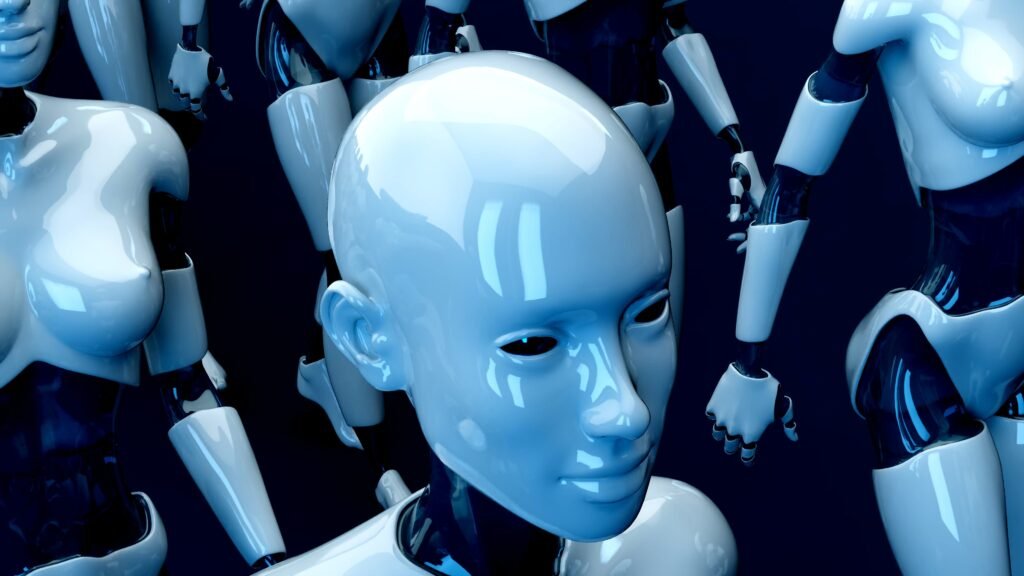Imagine a world without Siri, Alexa, or self-driving cars. It’s hard to picture, right? These everyday innovations all have one thing in common: artificial intelligence. But have you ever wondered when the term “artificial intelligence” was first used? Travel back in time with us as we explore the origins of this groundbreaking concept and uncover the fascinating history behind its very name.

Early Concepts of Artificial Intelligence
The Origins of Artificial Intelligence
Artificial Intelligence (AI) is a field that has fascinated and captivated human minds for centuries. The earliest concepts of AI can be traced back to ancient times, where people envisioned creating mechanical beings that could mimic human behavior. For example, in Greek mythology, there were tales of mechanical men, such as Talos, who possessed intelligence and were created by Hephaestus, the god of blacksmiths.
Early Notions of Thinking Machines
As civilization progressed, so too did the ideas surrounding AI. In the 18th century, inventors attempted to create machines that could mimic the human thought process. One such example was the Mechanical Turk, a chess-playing automaton created by Wolfgang von Kempelen. Although later revealed to be a hoax, the Mechanical Turk showcased the human desire and curiosity to create machines that could exhibit intelligence.
The Phrase ‘Artificial Intelligence’
The Creation of the Term
The phrase “Artificial Intelligence” itself was coined in the mid-20th century to describe the ability of machines to demonstrate intelligence akin to human beings. It was an umbrella term that encompassed the idea of creating machines that could think, reason, and potentially surpass human cognitive abilities.
Coined by John McCarthy
John McCarthy, an American computer scientist, is credited with coining the term “Artificial Intelligence.” In 1956, McCarthy organized the Dartmouth workshop, where a group of experts gathered to discuss the possibility of creating machines that could mimic human intelligence. During this workshop, McCarthy introduced the term “Artificial Intelligence” to encapsulate the field they were exploring.
Dartmouth Conference and the Birth of AI
The Dartmouth Conference of 1956
The Dartmouth Conference, held in 1956, marks a significant milestone in the history of AI. It was at this conference that a group of brilliant minds from various fields, including mathematics, psychology, and computer science, came together to discuss the potential of creating intelligent machines. This conference served as a catalyst for AI research and laid the foundation for the field to develop further.
Defining AI as a Field of Study
One of the outcomes of the Dartmouth Conference was the establishment of AI as a distinct field of study. Participants aimed to create machines that could perform tasks that would typically require human intelligence. The focus was on developing algorithms and techniques to enable machines to mimic human thought processes, problem-solving abilities, and decision-making skills.
The Golden Age of AI
Advancements in AI Research
Following the Dartmouth Conference, the field of AI experienced tremendous growth and enthusiasm. Researchers embarked on exploring various approaches, including symbolic logic, neural networks, and expert systems, to advance the capabilities of AI. They focused on developing algorithms and models to enable machines to make decisions, solve complex problems, and learn from data.
The Birth of Expert Systems
One significant breakthrough during this period was the birth of expert systems. These systems utilized knowledge from human experts and encoded it into a computer program, enabling machines to provide expert advice and solutions in specific domains. Expert systems opened doors to practical applications of AI in areas such as medicine, finance, and engineering.

AI in Pop Culture
AI in Science Fiction Literature
The concept of AI has long captured the imagination of authors and storytellers. Science fiction literature has been instrumental in shaping public perceptions and introducing AI to a broader audience. Authors like Isaac Asimov and Philip K. Dick explored complex themes of AI, robotics, and the ethical implications that arise as machines become more intelligent.
AI in Films and TV Shows
The portrayal of AI in films and TV shows has further popularized the idea of intelligent machines. From classics like “2001: A Space Odyssey” and “Blade Runner” to contemporary hits like “Ex Machina” and “Black Mirror,” AI has often been depicted as both a force for good and a potential threat to humanity. These fictional representations have sparked discussions and debates about the future implications of AI.
AI Winter and Backlash
Challenges and Setbacks in AI Development
Despite the initial optimism and progress, AI faced significant challenges and setbacks, leading to what is commonly referred to as “AI winter.” During the 1970s and 1980s, the high expectations for AI were not met, and progress stagnated. The complexity of tasks such as natural language processing and computer vision proved more challenging than anticipated, leading to a decline in funding and interest.
Public Perception and Concerns
In addition to technical difficulties, public perception and concerns played a role in the AI winter. Movies like “The Terminator” and “The Matrix” portrayed AI as a threat to humanity, fueling anxieties about the potential consequences of creating highly intelligent machines. These concerns, combined with the lack of significant advancements, contributed to a decline in public support for AI research.

Resurgence and Recent Years
Emergence of Machine Learning
The resurgence of AI came with the emergence of machine learning in the late 1990s and early 2000s. Machine learning techniques, particularly neural networks, enabled computers to learn from data and improve their performance over time. This breakthrough allowed AI systems to tackle complex tasks such as image recognition, natural language processing, and speech synthesis with unprecedented accuracy.
Breakthroughs in Deep Learning
Deep learning, a subfield of machine learning, has revolutionized AI in recent years. By building complex neural networks with multiple layers, deep learning algorithms have achieved remarkable breakthroughs in various domains. Applications like autonomous vehicles, voice assistants, and medical diagnostics have benefited from the ability of deep learning models to extract patterns and make intelligent predictions.
The Future of Artificial Intelligence
Ethical Considerations
As AI continues to advance, ethical considerations become increasingly important. Questions arise regarding the potential impact on employment, privacy, and the potential misuse of AI technology. It is crucial to ensure responsible development and deployment of AI systems to address these concerns and prevent any unintended negative consequences.
Integration with Various Fields
The future of AI lies in its integration with various fields and industries. AI has the potential to revolutionize healthcare, finance, transportation, and many other sectors. By combining AI algorithms with domain-specific knowledge and expertise, we can harness the power of intelligent machines to tackle complex problems, enhance decision-making processes, and improve the overall quality of life.
Conclusion
From its early origins to the present day, the field of Artificial Intelligence has come a long way. What started as a mere concept in ancient mythology has evolved into a robust scientific discipline with numerous practical applications. Although challenges and setbacks have shaped its history, AI’s potential for positive impact remains undeniable. As we look toward the future, ethical considerations, responsible development, and interdisciplinary collaboration will play key roles in shaping the path of Artificial Intelligence. Armed with the knowledge and advancements of the past, we can confidently move forward, unlocking the vast potential that AI holds.




